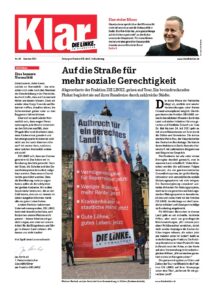Joint statement by Sevim Dagdelen, Heike Hänsel and Ana Miranda, members of the German Bundestag and the European Parliament, on the arrest of Wikileaks founder Julian Assange in front of HMP Belmarsh prison in London:
We, Members of the German Bundestag and the European Parliament, had planned a visit to Julian Assange for last Thursday and this Monday, that been approved and confirmed by the Ecuadorian Embassy. Julian Assange was arrested shortly before our visit.
Therefore, we are here today in front of the prison to protest against the arrest of Julian Assange.
We, in the strongest terms, condemn the behaviour of the Ecuadorian Government in the past week, which has been in flagrant violation of international law by rescinding Mr. Assange’s asylum, having stripped him of his Ecuadorian citizenship and signed off for the expulsion and subsequent arrest of Mr. Assange by having invited the British police in their mission for the arrest on behalf of the United States authorities. The US cited the Extradition Act while filing the request as was confirmed by the Metropolitan Police. This sets a very dangerous precedent that de facto imperils journalism, press freedom and protected speech everywhere.
The Ecuadorian Government is now trying to divert attention from its breach of the law by engaging in a disinformation and slander campaign against Assange to poison public opinion on Mr. Assange.
Our primary objective as members of the German Bundestag and the European Parliament is now to prevent the extradition of Julian Assange to the USA. This is an obligation of all upstanding publicly elected officials of EU member states that are signatories to international conventions including the Geneva Refugee convention, the UN Covenant on Civil and Political Rights, as well as the Charter of Fundamental Rights of the European Union, that prohibits the use of torture and inhuman or degrading treatment or punishment.
Nils Melzer, the UN Special Rapporteur on torture and other cruel, inhuman or degrading treatment or punishment, has voiced recently that Mr. Assange’s health was in „serious decline“ and if extradited to the United States, „such a response could expose him to a real risk of serious violations of his human rights, including his freedom of expression, his right to a fair trial and the prohibition of cruel, inhuman or degrading treatment or punishment“.
The United Kingdom has indicated repeatedly that Mr. Assange’s fear of being extradited to the USA was unfounded. Now we know it wasn’t.
We are faced with a humanitarian imperative now that Assange is in UK custody and a US extradition request is out for him to act, after high ranking officials of the U.S. – including President Donald Trump – have threatened the publisher with death.
Extradition to Sweden should also be avoided, because there, too, a transfer to the USA cannot be ruled out. This is why Assange was granted Asylum in the first place.
We note that the now published indictment of the US judiciary against Julian Assange does not contain any evidence that can be relied on in court and is apparently constructed. With its hunt for Assange, the US Department of Justice is targeting normal journalistic practice and the highly sensitive area of journalistic source protection. Assange is currently being accused of helping Chelsea Manning to crack a password.
The persecution of Mr. Assange sets a dangerous precedent by which journalists from anywhere around the world, including EU citizens, could be extradited to the US because the reporting could be considered to a risk to U.S. national security. This threatens to criminalize journalism globally.
Assange is likely to be punished for publishing thousands of government documents and uncovering serious U.S. war crimes. The charges are tantamount to revenge and are intended to deter imitators. The following applies: Not the disclosure of war crimes must be punished, but those who are responsible for these war crimes must be brought to justice. Charges under the Espionage Act cannot be discarded if he is successfully extradited to the US.
We want to stress that it is publicly known that the US, UK and Ecuadorian authorities joined efforts for what now seems like a planned attack on Julian Assange and WikiLeaks, whilst misleading the general public on their coordinated action.
We observe with grave concern that in the case of Mr. Assange, the USA is extending its prosecution onto European territory and in Latin America. This extraterritorial persecution is contrary to international law and must be condemned and rejected by European states. This is all the more true given that Assange is facing charges in the USA not only for conspiracy, but also on the basis of counter-espionage laws, which can mean a long prison sentence or even the death penalty.
Allegations against Julian Assange, which are made by private citizens in another European state, must be clarified. We would point out, that Mr. Assange has always expressed willingness to cooperate with the Swedish authorities. The British authorities have deliberately prevented such cooperation between Assange and the Swedish judiciary and have later destroyed files on this case. We are opposed to the prejudgement of Assange in order to discredit him as a person. The presumption of innocence applies; everything else contradicts constitutional standards.
We strongly oppose the criminalization of Julian Assange and WikiLeaks. In this context, we express our concern for the welfare after the arbitrary arrest of the Swedish national and Ecuadorian resident, Ola Bini, a celebrated privacy and open source advocate in Ecuador in the aftermath of the Assange arrest.
These two politically motivated arrests are in breach of the rule of law. Neither against Bini nor against Assange have convincing charges been presented. This sets a precedent that demonstrates that even EU citizens can be at risk.
We call on the British government not to extradite Julian Assange to the USA. The European Union must take action to everything to protect a politically persecuted publisher and journalist. We call on the governments of the Federal Republic of Germany and Spain to grant political asylum to Julian Assange and to work within the EU and the European Council to grant protection and hinder the extradition.
London, 15th of April, 2019
Heike Hänsel, MP, Germany
Sevim Dagdelen, MP, Germany
Ana Miranda, MEP, Spain









